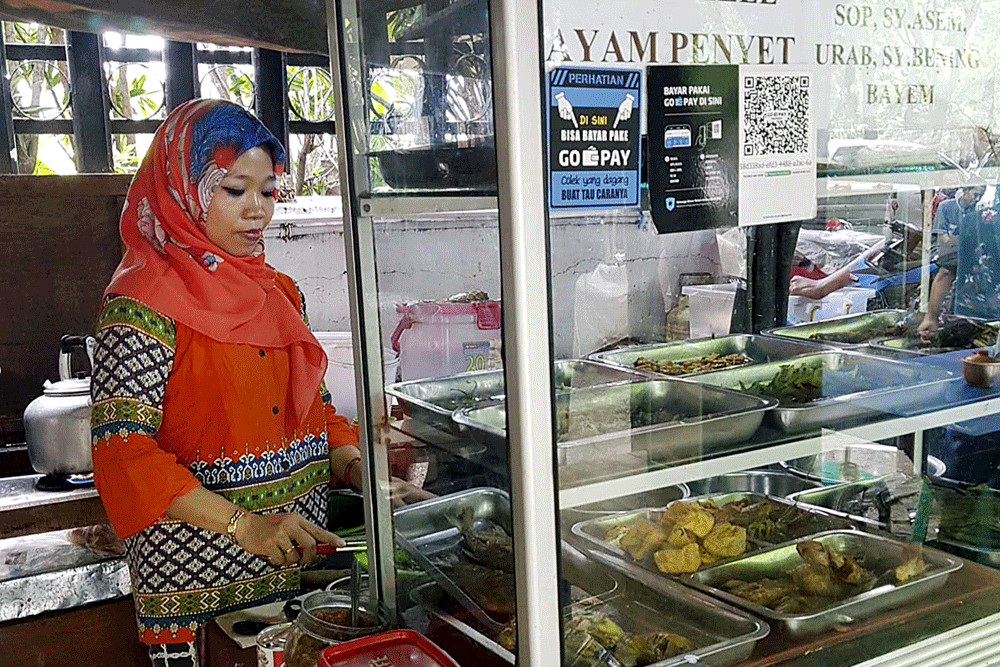Popular Reads
Top Results
Can't find what you're looking for?
View all search resultsPopular Reads
Top Results
Can't find what you're looking for?
View all search resultsStart-ups help SMEs digitalize during pandemic
Change text size
Gift Premium Articles
to Anyone
 No cash needed: Sutariyah, a 36-year-old food seller, prepares meals for customers in her food stall located in front of Al-Azhar University in Kebayoran Baru, South Jakarta, on Friday. Her food stall accepts cashless payments using QR codes from some e-wallets such as Go-Pay, OVO and OttoPay. (-/-)
No cash needed: Sutariyah, a 36-year-old food seller, prepares meals for customers in her food stall located in front of Al-Azhar University in Kebayoran Baru, South Jakarta, on Friday. Her food stall accepts cashless payments using QR codes from some e-wallets such as Go-Pay, OVO and OttoPay. (-/-)
M
ajor Indonesian start-ups, such as Grab, Gojek and LinkAja, have provided features and promotions to facilitate micro, small and medium enterprises (MSMEs) in digitalizing their business to survive the pandemic-induced economic downturn.
Ride-hailing company Grab Indonesia introduced Thursday a new app called GrabMerchant, aimed as a one-stop service platform that allows MSMEs, including those in food and beverage business, to digitally manage their operational hours, orders, employees, as well as menu and promotions.
“We developed this feature because we understand that our partnering merchants face difficulties in accessing a purchasing network to meet their supply needs,” Hadi Surya Koe, the head of marketing at Grab Indonesia, said at a virtual press briefing on Thursday.
Food and beverage businesses partnering with Grab can also benefit from the grocery feature to purchase staple supplies at a special price, the company announced.
To do so, Grab Indonesia, which has recorded 187 million app downloads, cooperates with online grocery marketplace TaniHub and Sayurbox to provide next-day delivery of the supplies to its 100,000 merchants in seven cities.
Small businesses, which contribute around 60 percent of the country’s economy, are losing sales because of the coronavirus restrictions, which are now being phased out in some places.
The government has also allocated part of its Rp 641.17 trillion (US$45.1 billion) economic recovery stimulus to soften the impact of COVID-19 on micro, small and medium enterprises (MSMEs). For example, it has earmarked Rp 34.15 trillion in interest payment subsidies for ultra-micro businesses under the government’s UMi and Mekaar programs.
Hadi said small businesses, employing the majority of the national workforce, currently accounted for 80 percent of Grab’s partnering merchants.
Neneng Goenadi, the managing director of Grab Indonesia, said Thursday that the COVID-19 pandemic was pushing consumers to change their behavior toward online services, but SMEs were largely “unprepared to face the new normal” — a period during which people are forced to coexist with COVID-19 while waiting for a vaccine to be developed and licensed.
Technology giant Gojek also announced on June 4 that it had facilitated 100,000 MSMEs to digitalize their business, aligning with the consumer trend of online purchasing during the pandemic.
The company offers in-app on-demand services for customers of MSMEs, including food delivery service GoFood, e-wallet GoPay, as well as courier service GoSend.
It also provides services to help facilitate MSMEs' digitalization, such as GoBiz, part of its app that allows small businesses to manage their company online as well as Selly, which can help businesses optimize their sales by targeting potential customers.
“In a time like this, it’s very important for MSMEs to have the ability to perform digital transformation and to move their business online. Restaurants, cafes and small shops can no longer rely on customers coming in person to their locations,” Gojek co-CEO Andre Soelistyo said on June 4 in an official statement.
The company’s recent acquisition of payment startup Moka has also boosted its point of sales (PoS) so MSMEs can systematically manage their transactions and finance, the company stated.
E-wallet platform LinkAja is pushing for an increase in digital transactions among MSMEs through various promotions, including 20 percent cashback for purchases in traditional market as well as 10 percent cashback for transactions in modern retailers and local merchants.
The e-wallet platform, which partners with more than 200,000 local merchants, has seen a 64 percent surge in digital transactions in traditional markets and 12.8 percent in modern retailers.
“The government policy to enforce social and physical distancing has changed preferences for public transaction. Not just for consumers, digital transactions are also essential for MSMEs to survive the pressure of the COVID-19 pandemic,” LinkAja president director Haryati Lawidjaja said in a statement released on Friday.









